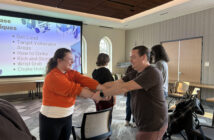
Brianna Cimaglia
As I stepped off the bus toward the most southwestern point in the Eastern Hemisphere, the Cape of Good Hope in South Africa, the steep cliffs and the sounds of the water below soothed me. It was peaceful here. As I cautiously climbed to the edge of the African continent to enjoy the serene views, I was horrified by what I saw crashing into the cliffs below me.
Brightly-colored wrappers and bottles perfectly contrasted the azure waters, showing their intrusion. It appeared that pollution even touches the edge of the world.
Personally, I have never been one to talk about the environment. This is not to say that I don’t care about it, but I certainly don’t think about it very often.
I do my best to protect it, participating in things like turning off lights when I leave a room, recycling as often as I can and using a reusable shopping bag for groceries. But when it comes to environmental advocacy, I contribute the same as other decent humans do. I would not consider myself a person who goes above and beyond for it.
In light of the presidential primaries and increasing media attention given to advocates like Greta Thunberg, the discussion regarding climate change is heating up, and my awareness of the environment has been piqued.
Regardless of your perspective on climate change, there is no harm in trying to minimize waste and participating in “green” efforts. There does not need to be an ultimatum, like to use a reusable water bottle or have your grandchildren die of large-scale flooding in 50 years. It should not be so difficult to do good for the simple reason besides that it is for the common good.
Admittedly, this is easier said than done. Humans are naturally in their own world, thinking that any action they could take is insignificant and will not contribute to change in either direction.
So what if I put my plastic cup in the trash? It is not like this single cup is the reason for environmental destruction.
In essence, this is true. Recycling a single cup will not make a difference. It will not protect my future grandchildren from the extremities of climate change. But if I don’t choose to recycle, and you don’t choose to recycle, then who will? Sure, this is cliché, but perhaps that comes from its validity.
Considering statistics from Lehigh’s Eco-Rep group, it is apparent that a majority of Lehigh students are not choosing to enact positive environmental change.
I spoke to a Lehigh Eco-Rep coordinator, who conducted a waste audit in a freshman dorm in fall 2019. The results disturbed me. She explained that over 10 percent of the waste disposed of in trash cans could have been recycled. And perhaps more shockingly, over 55 percent of the waste disposed of in recycling bins could not actually be recycled. Since the recycling services at Lehigh will not take the recycling if it is contaminated by more than 0.5 percent, it rendered all the truly recyclable items useless.
It is concerning that Lehigh students — people who are youthful and intelligent enough to contribute to positive change — simply are not.
The problem may not stem from neglect and intention, but rather a lack of education. Do most people know that not all plastic can be recycled? Do most people know that plastic straws cannot be recycled? Or that they need to rinse recyclable items so they do not contaminate the other items in the bin?
Before becoming an Eco-Rep at the beginning of last year, I was not aware of any of this. To be honest, sometimes I still forget what can and cannot be recycled. But we need to prioritize this education.
Together, we need to remember that if we choose not to make a difference, who will? We need to slow down our hasty lives and take time to examine our impact. We don’t all need to become environmental advocates — constantly spitting out recycling facts and becoming angered at politicians for not speaking about the environment at debates. But it should be our duty to try to minimize our impact as much as possible. This starts with becoming knowledgeable about what can and cannot be recycled.
After all, how can we expect things like world peace if trash extends to the edges of the earth?
Brianna Cimaglia is an associate news editor for The Brown and White. She can be reached at bcc221@lehigh.edu.






Comment policy
Comments posted to The Brown and White website are reviewed by a moderator before being approved. Incendiary speech or harassing language, including comments targeted at individuals, may be deemed unacceptable and not published. Spam and other soliciting will also be declined.
The Brown and White also reserves the right to not publish entirely anonymous comments.
1 Comment
Most people seem to be to some degree: disinterested, lazy, selfish, egotistical, unknowledgeable and perverse.
With all this going for them is it any wonder recycling has trouble working. Many of these characteristics can be countered by greed or similar attitude with a better connotation. Of course there are some people who will recycle because it is a good thing to do.
We need poor third world immigrants who can sort trash and keep, sell or compost anything they find and discard anything with no value. At one time, American community values were such that recycling would have been successful. Not going to happen in today’s America. I saw it work in 70’s Vietnam.
“She explained that over 10 percent of the waste disposed of in trash cans could have been recycled. And perhaps more shockingly, over 55 percent of the waste disposed of in recycling bins could not actually be recycled.” These results are disgusting and perverse but just another example of the abuse of freedom now so popular in the US.